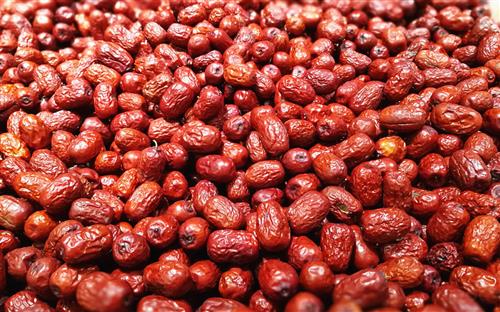How do you eat hot jujube?
Jujube has always been regarded as a health care product, especially female friends often eat jujube, as the saying goes, “Three dates on a day, youth is not significantly olderâ€, Chinese medicine believes that jujube sweet and spleen, can play a tranquilizing blood, make up The effect of temper, but the red dates are good but can not eat, red dates eat too much there will be side effects.
Effect of jujube
Jujube is a medicine and food homogenous food, which is eaten regularly by females. Red dates contain a large amount of nutrients. The main sugars contained in them include fructose, sucrose, glucose, oligosaccharides, etc., and also contain a lot of vitamins. These substances can improve Human immunity plays a role in nourishing. The flavonoids contained in jujube – double-glucoside A flavonoids, have antihypertensive, hypnotic, and sedative effects, and play an sedative effect. In addition, red dates can also help the spleen and stomach, qi and blood, relieve fatigue. In winter, women with cold hands and feet can eat dates to condition their body. After the illness, the weak and anemic people can also eat dates to regulate their body.

How will eat jujube
Jujube has many effects. Some people think that jujube is a good thing to eat. Therefore, each time you eat a lot, this is actually wrong. You must control the amount of everything, and you must not eat too much. Although jujube is good, you can not eat more. What will happen if you eat more red dates?
1, get angry. Jujube is a warming food. If the food is eaten too much at one time, it is easy to get angry and there are sores, blisters, nosebleeds, etc., especially if it is a person with internal heat, it should eat less. If you are already on fire, it is best not to eat red dates.
2, flatulence. People who have eaten red dates know that jujube skin is very hard, and jujube skin is not easy to digest after eating. It will stay in our intestines and affect digestion. If you eat too much at one time, it will cause flatulence.
3, edema. Persons with heavy body moisture, if you eat too much red dates, will be prone to phlegm and wet, so that more and more serious wet weight, especially during menstruation will appear swollen, eyelid swollen women eat too much red dates, then edema The situation will get worse.
4, tooth decay. We know that jujube is very sweet, red dates contain a lot of sugar, if you eat a lot of red dates, if you do not immediately gargle then it is easy to hurt the teeth, long time it is easy to decay.
5, excessive menstrual blood. People with constitutional heat may eat too much menstrual blood if they eat dates or drink red dates.
Red dates eat a few good days
Although jujube is good, we must also control the amount when we eat it. We can't eat too much at one time and avoid side effects. In this way, we can make better use of the efficacy of jujube. Then, how many good dates do red dates eat?
Jujube size varies, the amount of red dates eaten every day depends on the size of the red dates, under normal circumstances, a small red dates no more than 8 a day, a large red dates can not exceed 3 a day, eat more side effects, It is not easy to absorb, but it is counterproductive.
Recommended consumption, generally not more than 5, small not more than 8-9, jujube is generally 2-3, because one is more sugar, eating too much can lead to difficulties in absorption, waste, and second, more sweets, Will add the burden of the mouth and esophagus, the third is to meet the nutritional requirements. Of course, there is a need for temporary needs. Such as postpartum, blood loss, surgery, etc., cooking more than 10 problems a day.
Organic mung bean starch is a kind of powder formed by the precipitation of mung bean after soaking and grinding with water. Our organic mung bean starch follows the traditional processing ideas and combines modern industrial technology to achieve a more efficient, safer, and more hygienic processing level. The characteristics of mung bean starch are sufficient stickiness, low water absorption, white and shiny color.
Mung bean (Vigna radiata) is a plant in the legume family. Mung beans are mainly grown in India, China, and Southeast Asia. The Chinese have grown mung beans for nearly 2,000 years. They are ubiquitous in China, and there are many types, and numbers. Mung beans are also grown in other countries/regions in South Asia, North America, Brazil, and Europe. The main provinces for mung bean cultivation in China are Anhui, Henan, Hebei, Hubei, Liaoning, Shanxi, Shaanxi, and Sichuan.
The nutritional value of mung bean starch is very high, and its uses are also very wide. For example, mung bean starch has antibacterial, antibacterial, hypolipidemic, antitumor, and detoxification effects.
Mung bean starch contains a considerable amount of oligosaccharides (pentosan, galactan, etc.). These oligosaccharides are difficult to be digested and absorbed because the human gastrointestinal tract does not have a corresponding hydrolase system, so mung bean starch provides a lower energy value than other grains and has an adjuvant therapy effect for obese and diabetic patients.
Mung Bean Starch,Organic Mung Bean Starch,Mung Bean,Mung Bean Starch Organic
Organicway (xi'an) Food Ingredients Inc. , https://www.organicwayinc.com
